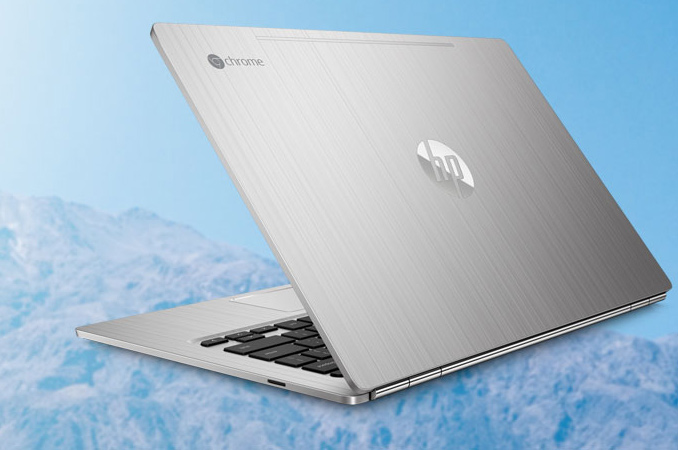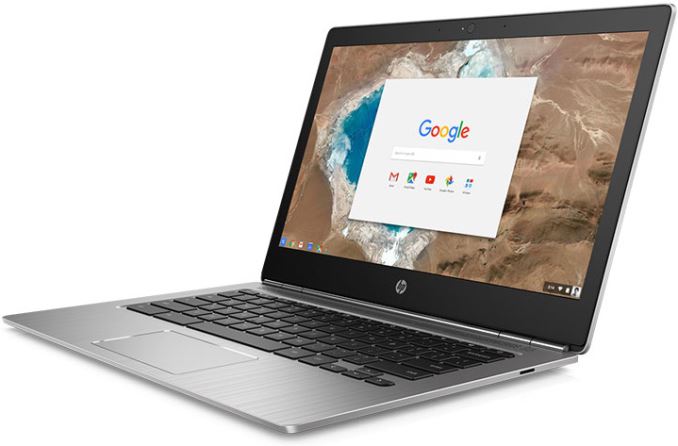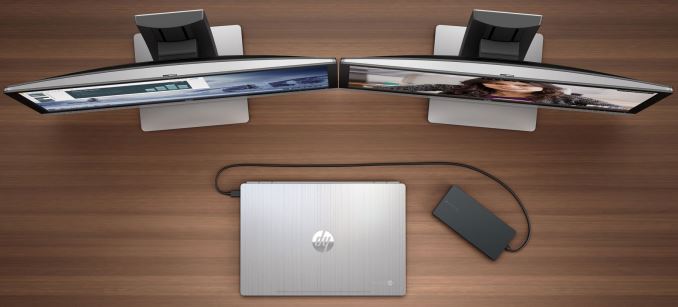HP Unveils Premium Chromebook: 3K Display, Intel Core M, 16 GB of RAM and USB-C
by Anton Shilov on May 3, 2016 8:00 AM EST
HP has announced a new family of Chromebooks, which are powered by Intel’s high-performance processors and feature stylish design, aluminum body, high-resolution display and even Bang & Olufsen speakers. The new laptops will not be as affordable as many other mobile PCs running Google Chrome OS and will not be as powerful as Google’s Pixel, however, this is what HP believes to be the right balance between performance, style, portability and price.
When Acer and Samsung introduced their first notebooks based on Google’s Chrome OS in mid-2011, they praised their low price and mainstream computing capabilities. At the time, Chrome OS was a mystery for most people, netbooks were relatively popular and it made sense for the aforementioned PC makers and Google to address the entry-level segment of the market with something very affordable. As Chrome OS gained traction, PC makers began to install higher-performing components into their Chromebooks. However, they were still not ready to address the high-end market segment with such PCs, which is why Google released its Pixel laptop in 2013. The Chromebook Pixel is one the most advanced and stylish Chromebooks ever made because of its Core i7 “Broadwell” CPU, a display with 2560×1700 resolution and 3:2 aspect ratio. But, the Pixel costs $999 and not all users are ready to invest that sum in a Chromebook. Fortunately, different PC makers offer various systems that attempt to replicate some of the Pixel’s features. HP decided to build its own competitor for Google’s Pixel and while the product is not exactly affordable, it has a better screen than most Chromebooks and a number of other advanced features.
The HP Chromebook 13 sports a 13.3” IPS display with 3200×1800 resolution (QHD+), 170-degree viewing angles and 16:9 aspect ratio, which is good for multimedia applications and video. HP’s latest Chromebook comes in brushed anodized aluminum chassis, it is 12.9 mm thick and weighs 1.29 kilograms (2.86 pounds), which is thinner and lighter than Apple’s MacBook Air 13”. Despite the very high resolution screen, the laptop works up to 11.5 hours on one charge of its 45 Wh battery, according to the manufacturer.
To enable long battery life, HP used Intel’s Skylake-Y system-on-chips to build its Chromebook 13. Various versions of the system are powered by either Pentium or Core M SoCs with two cores, Intel’s HD Graphics 515 (Gen9) core with 24 EUs (execution units) as well as 6W or 4.5W TDP. The system will likely be considerably faster than other Chromebooks running Atom, Celeron or Pentium processors because of the high-performance CPU architecture.
| HP Chromebook 13 Specifications | |||||
| Screen Resolution | 3200×1800 | ||||
| CPU | Intel Core m7-6Y75 | Intel Core m5-6Y57 | Intel Core m3-6Y30 | Intel Pentium 4405Y | |
| Graphics | Intel HD Graphics 515 (Gen9, 24 execution units) | ||||
| RAM | 16 GB | 8 GB | 4 GB | ||
| Storage | NAND flash storage | ||||
| Wi-Fi | 2x2 MIMO 802.11ac Wi-Fi module (?) | ||||
| Bluetooth | Bluetooth 4.2 (?) | ||||
| USB | 2×USB-C, 1×USB-A ports | ||||
| Other I/O | Microphone, stereo speakers, audio jack | ||||
| Thickness | 12.9 mm/0.5 inch | ||||
| Weight | 1.29 kilograms / 2.86 pounds | ||||
| Price | $1029 | $819 | $599 | $499 | |
Depending on the model and price, the HP Chromebook 13 can be equipped with 4, 8 or 16 GB of RAM, an unknown amount of solid-state storage as well as wireless connectivity technologies (a 802.11ac Wi-Fi module with Bluetooth 4.2 is likely, but is not confirmed by HP). HP notes that its system has a full-sized backlit keyboard as well as Band & Olufsen-tuned speakers, which is something new for a Chromebook. The system also has a webcam, three microphones, a 3.5 mm audio port, a SD card reader, one USB Type-A port as well as two USB Type-C ports. The Chromebook 13 uses USB-C for charging and is therefore compatible with a variety of third-party chargers.
With its advanced Chromebook 13, HP offers its Elite USB-C Docking Station ($149), which plugs in to a USB-C port on the PC and enables to connect up two Full HD displays, Gigabit Ethernet as well as multiple USB Type-A devices, such as keyboards or mice.
Four versions of the HP Chromebook 13 should hit the U.S. retail shortly. The most basic model running the Intel Pentium 4405Y processor and equipped with 4 GB of RAM will cost $499, whereas the top-of-the-range system featuring the Intel Core m7-6Y75 and 16 GB of RAM will cost $1029, which is even more than Google’s Pixel.
















145 Comments
View All Comments
jabber - Tuesday, May 3, 2016 - link
That's okay chap. If you enjoy constant updates, waiting for them, driver installs, software issues, security weaknesses blah blah blah (that happen whether you are noob or Windows blackbelt) then you carry on. Me? I'll be doing something more productive.inighthawki - Tuesday, May 3, 2016 - link
Yeah none of those are issues for me.Constant updates - you mean... once a month?
Driver installs - Everyone should be doing this, including Linux, ChromeOS, etc. Drivers are not unique to the windows ecosystem. Not to mention outside of graphics drivers, driver updates are extremely rare, especially on OEM devices after they ship.
Software Issues - Like what? My 20 your old copy of Photoshop 1.0 written for Windows 95 doesn't work correctly? I guess I can see how ChromeOS might avoid that issue by never having the software. But otherwise all my software works fine, including my copy of Red Alert 2 I just played the other day.
Security weaknesses blah blah blah - Please don't be 'that guy' who thinks that Windows is a walking timebomb and all Unix variants are just iron tanks. ChromeOS is no more or less secure than Windows is.
I have no problem admitting there is room in the world for ChromeOS, but it's really funny to believe that it is "productive" compared to a full blown variant of Windows, OSX, or Linux.
Michael Bay - Wednesday, May 4, 2016 - link
Productivity to them is facebook and instagram.tuxRoller - Wednesday, May 4, 2016 - link
Chromeos isn't "just another UNIX variant".According to every security analysis who I've ever heard talk about this, chromeos is the most secure customer facing OS that is commonly used.
The damn thing is built like a tank.
gd22 - Thursday, May 5, 2016 - link
I got tired of windows problems, so maybe I haven't given the new window 10 enough of a chance. A window 8.1 laptop that was supposed to update to Windows 10 didn't and wouldn't play nice, after hours. Took it to Microsoft, after 2 weeks they also gave up, and gave it back to be erased to bare metal with a windows 8.1. A desktop, did correctly update to windows 10, but it took hours to get it working, and I'm not happy with it. After that and too many other similar MS experiences, I'm not willing to give MS mny more chances. The Chromebooks have been wonderful. My knocks on Chromebooks are SSH Keys are difficult, wireless printing with older printers is also a PITA, and usage as developer machine has been neglected, with for example Google dropping development of CDE.Michael Bay - Wednesday, May 4, 2016 - link
This mantra is probably older than you are.Waiting for updates? Are you writing this from 2000AD, on a 33.6k modem? Driver installations that happen silently for god knows how many years already? Software issues that are agnostic for any platform? Security weaknesses that are the same?
okay - Tuesday, May 3, 2016 - link
I think there are two different issues here: The reputation that windows machines have for having recurring annoyances and problems that made the OS unpleasant to use. These are often security related, update related, or "doesn't allows play perfectly well with the hardware" related.Some power users don't mind this; other power users find windows annoying; but most importantly noobs can find the above very stressful. Apple has capitalized on this, in the past.
The other perspective here isn't so much that 'windows sucks' but rather that ChromeOS is designed in a way that *especially* keeps the OS out of the way. The UI is well designed for this. They boot nearly instantly. System updates are almost fully transparent and never cause problems. Not even OS X is as good as ChromeOS in this area. Not everyone appreciates this, but for some it really makes a difference when using a computer.
jabber - Tuesday, May 3, 2016 - link
Spot on! Windows is too big and bulky now. It gets in the way for a lot of users, wants you to do this or that, wont let you escape. It's like having to take a 747 to the shopping mall. Most people don't need or want that anymore.nikon133 - Monday, May 9, 2016 - link
All of my machines work every time I power them on. Since I've upgraded system HDDs with SSDs on "older" machines (new ones have SSD by default), every single one boots from cold start in 10 seconds or less. Updates happen in background; only when they require restart, am I aware of them - but they don't require restart every week... Surface is the only one I keep is sleep all the time, and it does apply updates and reboots overnight (if needed), and I wouldn't even have a slightest idea does it not require pin/password when I wake it up in the morning. And I will gladly restart my computer once every few weeks for full functionality. Power for those few who need only basics, but for rest of us...okay - Tuesday, May 3, 2016 - link
" But the shear joy of just having everything work is astounding. "Yes. Thus far, neither apple nor microsoft has produced laptop OSes which are as joyful to use as ChromeOS.